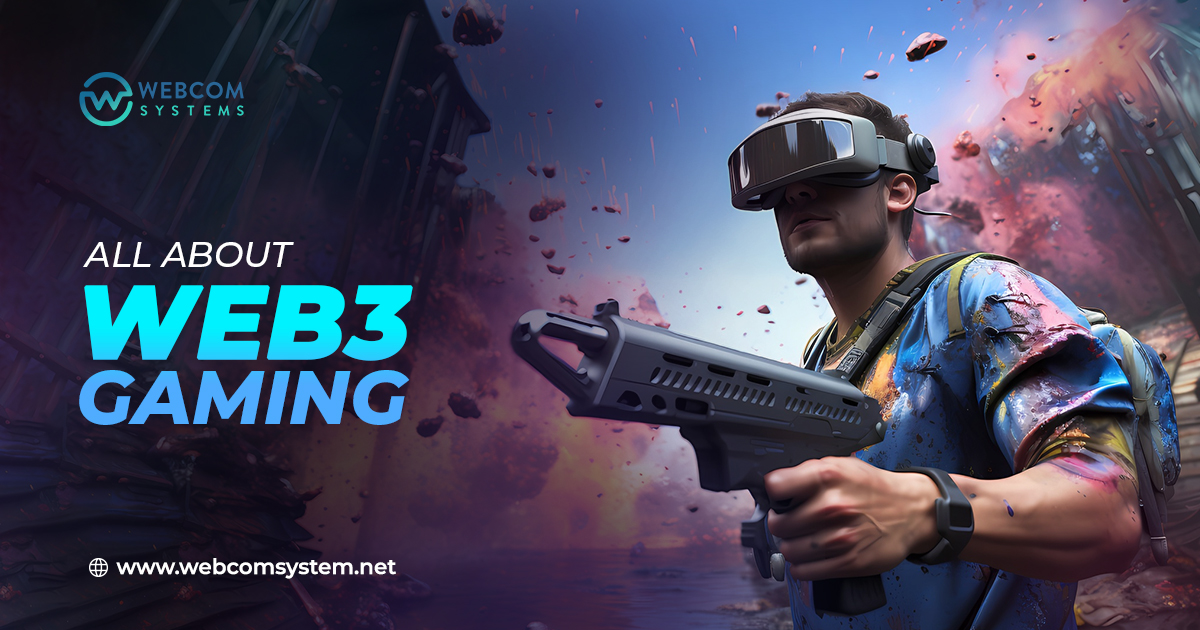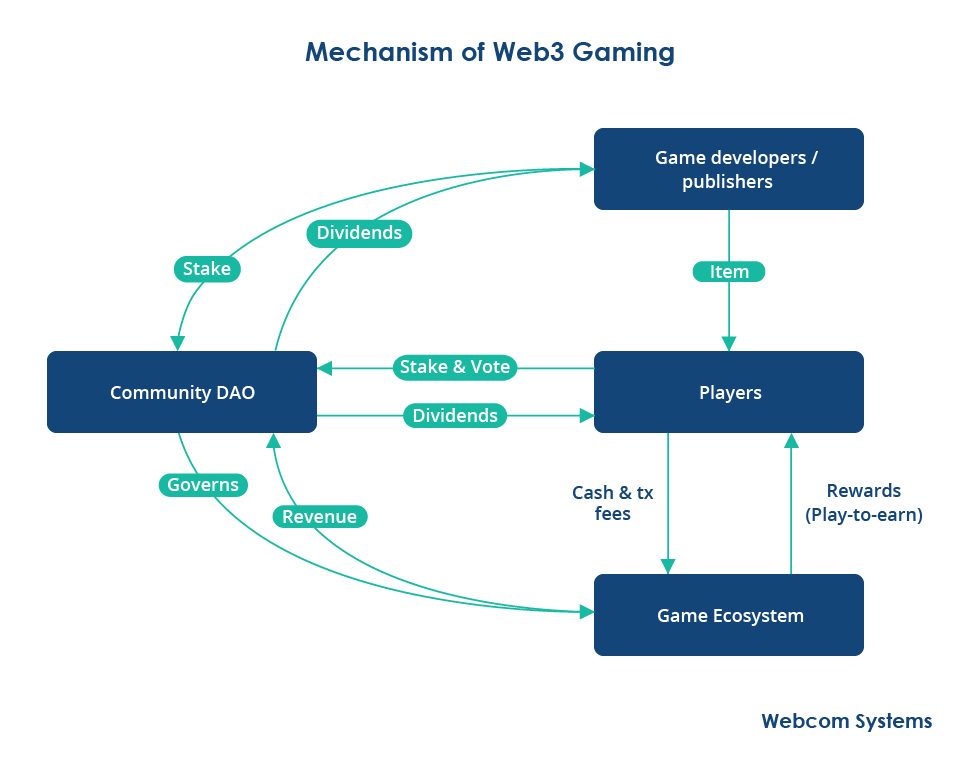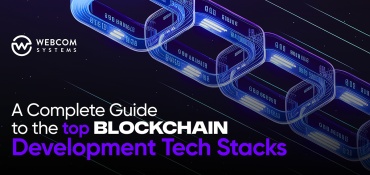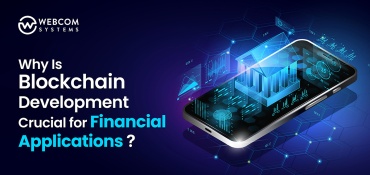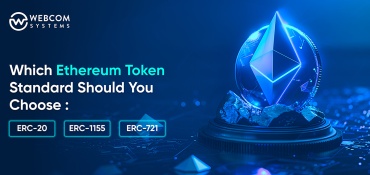Web3 has changed the gaming industry in incredible ways. As a result of the transition from traditional gaming platforms, Web3-based games provide players with the possibility to communicate with the games in a more modern and decentralized way. Cryptocurrencies and NFTs allow everyone to earn money for playing. This is the most important thing in the gaming world, and it is true for all aspects of gaming. It is the player who takes the main power and not the central authority within a game.
By 2024, Web3 gaming will be considered a notable part of the gaming market, with more and more gamers turning to Blockchain Technology for decentralization and transparency. Based on the numbers provided by CompTIA, almost 73 million gaming enthusiasts are using mainstream Web3 games such as Roblox and Fortnite. The trend can be attributed to the fact that Web3 technology is using the secure and transparent nature of blockchain technology, which has led to nearly 50% of all finance apps to adopt Web3 tech.
In traditional gaming, users can buy game content or digital assets either with fiat currency or can get them as rewards. However, the rights to the in-game content still belong to the game operators. In other words, the game users do not have ownership of the digital assets in the game. Rather, traditional gaming has no ownership for the players; they just have a license to access the game’s features. In addition, the game’s data, which is game-related, is stored on servers and controlled and operated by the game administrators. The game developers do not have the required resources or knowledge to enable a trade in which the players can exchange their digital assets to earn a profit.
The Future of Web3 Gaming in 2024
For these reasons, the inefficiency of centralized servers and traditional gaming has enabled gray markets to be formed, which offer room for hackers and scammers. They take advantage of players and provide no benefit to the developers and the administrators. Administrators do not protect gaming platforms and their players from shutdowns and cyberattacks. This is due to the centralized nature of the server and its low level of effectiveness in defending itself from hacking. The digital assets themselves are also exposed to the high risk of loss, fraud, and theft.
Web3 gaming offers novel approaches like gaming DAOs (Decentralized Autonomous Organizations) with decentralized gaming ecosystems, blockchain-based game asset ownership, play-to-earn, crypto-secured gaming wallets, and metaverse gaming to address the issues listed above.
This Article Talks About Web3 Gaming Aspects and its Dynamic Features.
- What is Web3 Gaming?
- What are the Main Features of Web3 Games?
- What Technology Stack Does Web3 Gaming Implement?
- What is a Gaming DAO?
- What are the Various Kinds of Gaming DAOs?
- What are the Various Web3 Gaming Development Services We at Webcom Systems Give?
All About Web3 Gaming
Web3 gaming is a decentralized gaming process in which the operations of a gaming ecosystem or a gaming platform, particularly about the ownership of gaming assets and decision-making in all aspects of gaming, are taken away from any central authority. Web3 games are created through blockchain integration into the gaming ecosystem, giving gamers a chance to dictate when and how the game should evolve. Web3 gaming also serves as the play-to-earn cornerstone for the players, transforming the pay-to-play aspect by providing asset trading, tradeable game tokens, and opportunities to earn in cryptos while playing. Statistical data of the Web3 gaming sector in 2024 reveal a surprising boom year with new features and technologies. In March 2024, the market value of blockchain-based game tokens grew approximately 24.1%, to a whopping $24.1 billion.
Web3 gaming offers transparent virtual markets for the gaming sector that allow players to have access to and fully own their in-game digital assets. These assets are saved as unique gaming NFTs. Web3 gaming also offers broad interoperability between gaming ecosystems by connecting in-game assets and players across platforms. The interoperability factor is determined by the type of blockchain platform chosen to be the basis of a gaming ecosystem. For example, Polkadot or Solana provides interoperability features in cross-chain communication bridges.
Having Learned Everything about Web3 Gaming, Let’s Go through the Characteristics of Web3 Gaming in the Next Section.
What Are the Main Features of Web3 Games?
Web gaming is a game-playing model based on value exchange, and users can own and trade in-game objects and collectibles as unique NFTs using cryptocurrencies. Web Gaming allows for self-sovereignty and decentralization in gaming and is open source. There are some fundamental features of Web3 gaming platforms:
Ownership and Interoperability
Web3 gaming grants self-ownership in which players have the power to completely own in-game assets and collectibles as digital NFTs. In traditional gaming, players can own in-game assets and collectibles, but they lose all their assets when they move the gaming platform. This problem is solved by Web3 gaming, which provides actual ownership and interoperability across different platforms. The players get to own assets inside the game on one platform and move them to another when they switch to another gaming platform.
Old Game Integration
Web3 gaming has a very interesting feature: integrating and upgrading old game models into metaverse and blockchain platforms and making them decentralized. The way of gaming is individual, and each gamer has his/her preferred game. Web3 enables the transformation of existing and traditional games to the metaverse, where users can create their avatars and trade in their favorite in-game assets and collectibles.
Player-Driven Gaming
The Web3 gaming setting is created based on what players enjoy. When it comes to Web3 gaming, players have a wide range of benefits. Firstly, it is the play-and-earn feature that allows users to earn by trading their in-game items. Secondly, is the old-game integration that solves the challenge of players who want to play their favorite games on the metaverse. Another aspect of player-driven gaming is that Web3 gaming takes care of self-sovereignty which is again good for gamers.
Negligible Downtime
Web3 gaming ecosystems operate without human interference and require virtually no maintenance cost. They are regulated by themselves. Through block minting and high-level game data storage, Web3 gaming is virtually indisputable, has no downtime, and is highly scalable.
Transparent Gaming
In Web3, games process and host on the blockchain, rendering them unhackable. Blockchain-based gaming has no single point of failure, and the network operates by voting consensus to change the gaming process, all the players interact on the network and have equal access to the system. By this token, Web3 gaming guarantees a high level of transparency.
Also Read: How to Develop DApps in Web 3.0: A Comprehensive Toolkit for Developers
What Technology Stack Does Web3 Gaming Implement?
The Following are the Components of the Web3 Gaming Technology Stack:
Web3 Libraries/DApps
Web3 libraries allow game developers and players to do transactions with the blockchain platform. Game developers utilize libraries and dApps to facilitate in-game microtransactions and asset interactions, integrating them with smart contracts. Web3 gaming dAPPS rely on Unity or Unreal SDKs for construction. As the protocol establishes connections between EVM and non-EVM blockchains, Web 3 libraries transform their role.
Smart Contracts
Smart Contracts can track and manage all the processes in the game. Smart contracts actively manage the voting and decision-making processes for implementing modifications in game development, allowing players to modify them as needed while also overseeing changes in game evolution. The majority of developers use the Remix IDE to write, compile, and deploy smart contracts.
Node/Web3 Providers
Nodes or Web3 providers are essential because they serve as intermediaries between the blockchain network and the gaming information. Nodes are an essential component of the Web3 developer stack, without which Web3 libraries cannot interact with smart contracts.
Digital Wallets
Each Web3 gaming platform has blockchain-based digital wallets. Each player has an individual wallet address to uniquely identify them. It has various gaming collectibles and in-game assets. The wallet is one of the key Web3 game components that allows players to interact with the blockchain.
XR Hardware
XR hardware consists of smart glasses, haptic gloves, scanning sensors, and more that integrate the gaming ecosystem with the metaverse for an immersive and interactive Web3 gaming environment.
Open, Interoperable Media Standards
These standards have texts, audio, 3D scenes, and vectors to power 3D decentralized applications.
Now, Let’s Have a Look at other Web3 Gaming Aspects such as Gaming DAOs and Metaverse Gaming.
What is a Gaming DAO?
DAOs in gaming function as playgrounds built on open-source codes and operate independently from any gaming authorities or operators. DAOs in gaming are all about community (and therefore), and their main goal is to build a decentralized game ecosystem.
Gaming DAOs are capable of redistributing the ownership of a game into a community of different kinds of gaming ecosystems. This process involves players, game developers, investors, and traders alike.
DAOs provide the gaming power for play to earn in Web3 gaming. These gaming ideas reward players for participating and succeeding in-game. Traditional gaming structures do not have the same advantages and provide a one-way transfer of value to game owners or operators. In gaming DAOs, the “play-to-earn” feature is a win-win situation for both the player and the game developer. The gaming economy relies on play-to-earn, rewarding players for showcasing their skills in the game.
Let Us Now Have a Look at Some of the Featured Gaming DAOs in the Following Section.
What are the Various Kinds of Gaming DAOs?
Three fundamental types differentiate the Gaming DAOs.
Gaming Guilds
Gaming guilds can be seen as informal groups of gamers who are united not only for a single game but also in the spirit of common communitarian grounds. Such gaming guilds are financialized as they work in the same manner as investment clubs, and the participants of these guilds share funds with the group to purchase and acquire in-game digital assets.
Guild members then play these games which make use of the assets they have acquired in the form of NFTs pertinent to the in-game context. Players win in-game tokens collectively and later distribute the earnings among themselves. Gaming guilds have ultimately strongly affected the Web3 gaming market because they have taken over all the in-game assets. There is also a rapidly growing population of new players, game speculators, and NFT gaming traders.
Incubators and Accelerators
Another type of gaming DAO is the class of incubators and accelerators which is a new class coming up. They mainly focus on the development of Web3 gaming platforms by sharing their experience with the platform’s founders. Their role involves offering financing to help with new gaming projects. They further give the developers and the game designers the necessary tools and technical solutions to develop Web3 games.
What Web3 Gaming Services Does Webcom Systems Offer?
Decentralized Gaming Platform
We build blockchain-based gaming platforms from scratch in line with your game project specifications. Through the buildup of an open-source gaming platform with a front end and a back end, we offer a decentralized and autonomous Web3 gaming ecosystem with a UI/UX design.
Gaming DApps
We are gaming NFT experts and we provide consulting services for designing, innovating, and launching gaming NFT marketplaces for you. From creating a roadmap to end-to-end design analysis, we build and implement interoperable marketplaces for the users.
Gaming NFT Marketplaces
The NFT Gaming specialists on our team will help you design, innovate, and launch your gaming NFT platform. We design fully functional marketplaces from scratch, from the roadmap to the full design analysis, and we develop them to be interoperable.
3D Gaming Spaces
Our gaming metaverse is a robust and highly scalable 3D gaming engine where players can have an immersive experience in our 3D gaming models.
Smart Contracts Development
We design smart contracts that control the rules and the code of your gaming metaverses and DAOs, and nobody can change these smart contracts. Hence, it secures Web3 gaming platforms and makes them function based on the DAO community’s decision rules.
The Bottom Line
Web3 gaming has the power to change the entire game experience through the use of metaverse and blockchain technology. It has completely decentralized the gaming sector by doing away with the central game administrators and owners of gaming platforms. Technologies such as blockchain, DAO, and the metaverse, which are game-changers in Web3 gaming, are also revolutionizing the financial aspects of the gaming industry. It is making game players occupied with in-game digital asset trading and play-to-earn NFT tokens. Therefore, many consider Web3 gaming a positive advancement in the emerging digital gaming sector.
Webcom Systems can be the game changer in the gaming industry as it specializes in the development of Web3 and blockchain solutions. The company focuses on providing gamers with incredible, secure, and decentralized gaming capabilities using advanced tools like blockchain, smart contracts, and NFTs. Webcom Systems stands out with its player-oriented strategy, which includes the involvement of community members in decision-making and providing the community with a sense of ownership and belonging. Through NFT Gaming Platform technologies such as cross-game integration, smart contract development, and marketplace integration, Webcom Systems helps players gain real ownership of their in-game assets and even monetize their gaming experiences.
Also Read: Future of Metaverse: NFT Development is Now

